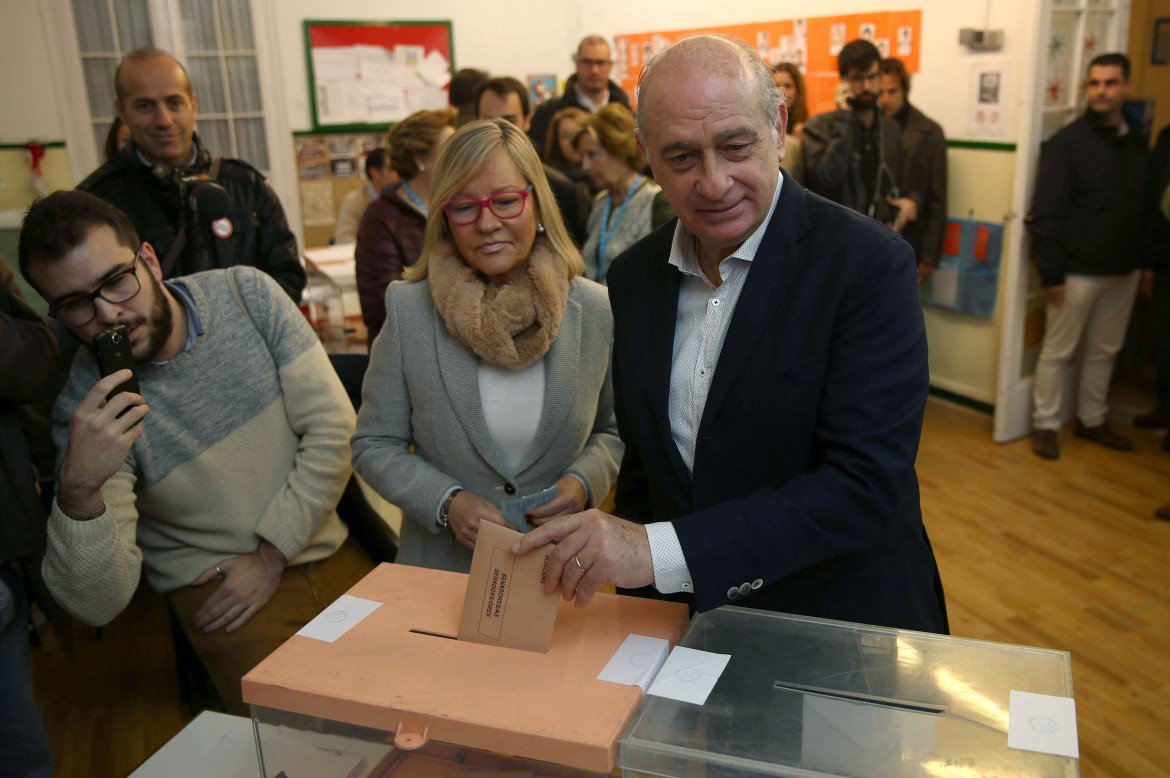Spain
A Spanish ‘Watergate,’ four days before the vote
The People’s Party interior minister is likely to be forced out after an explosive espionage scandal rocks the country four days ahead of elections.

Four days before the election that could put Unidos Podemos in the control room, a huge illegal espionage scandal has erupted directly involving the PP acting Prime Minister Mariano Rajoy’s interior minister, Jorge Fernández Díaz.
Fernández Díaz is a shady character who defends the police when they beat desperate migrants seeking to enter Europe by climbing over the barbed wire of Ceuta and Melilla (“Whoever wants them here, send me your address so we can send them to your home.”), grants silver crosses to the Blessed Virgin of Sorrows and Our Lady of the Most Holy Mary of Love, and has coined phrases such as “abortion is like ETA” or “same-sex marriage does not guarantee the survival of the species” or “victims of Francoism seek their families for money.” Well, this same character is at the center of another controversy Wednesday after the online newspaper Público published recordings of various conversations between the minister and the head of the Catalan anti-fraud unit, Daniel de Alfonso.
During these conversations in 2014 and 2015, the minister urged de Alfonso to fabricate evidence to indict the political leaders of the Catalan independence movement. But this is just the tip of the iceberg of a practice established with the arrival of the popular parties to power. Just after gaining head of the police, Fernández Díaz created the operational attached Directorate (DAO, under the Spanish acronym) with the explicit task of generating anonymous dossiers against current political enemies, from the separatists to Podemos.
A real institutional mudslinging machine, which has been greedily gobbled up by the right-wing media. While all parties in the Catalan Parliament (except for the PP) have already called for de Alfonso’s head (presumably he will be removed from office in a few days), the popular minister says he feels he’s been made a victim of the events. All other parties have demanded his resignation — this would be the second case this year of an interim minister forced to leave — while the Catalan president Carles Puigdemont asks him to give up his candidacy (the minister leads the roster of PP leaders in Catalonia).
Despite the seriousness of the charges, it is unlikely that this new scandal will erode the hardcore masses — according to surveys around 30 percent of the voters — who, despite everything, will support a party immersed in corruption scandals of all types and stuck in an awkward immobility by its President Mariano Rajoy.
Not surprisingly, Ciudadanos, its potential closest ally — with which it is engaged in a fight for votes — is calling for Rajoy’s head for the umpteenth time to allow a grand coalition with the Socialists, a dream of Albert Rivera and Rajoy himself. But for now the socialist Pablo Sánchez says they do not want that.
The problem is that the Socialists, who centered their campaign on attacks against Podemos and especially against Pablo Iglesias, are not the only ones who have not explained with whom they intend to govern the country after the elections. Unidos Podemos faced attacks by endlessly repeating the mantra “we are not the enemy, the PP is,” avoiding direct hand combat with the PSOE, also strong in polls that place it firmly in second place, only a few points behind the PP.
But everyone knows that, despite the almost certain overtaking of the PSOE by the leftist coalition, led by Iglesias and Garzón (Izquierda Unida), it could be the classic Pyrrhic victory if a weakened Sánchez ends up having to succumb to the pressure of the Socialist apparatus that considers Iglesias just a smokescreen and especially the idea of discussing the constitutional arrangement of the territories.
There is a concrete risk that the Socialists decide to support, perhaps with one abstention, a popular government supported by Ciudadanos, rather than supporting a red-purple government. It is not a coincidence that Iglesias challenges Sánchez to consult the base of the party to know who they would prefer to build a government agreement with. But this battle will begin on Monday after the vote.
As it is evident from the list of male names in this article that, despite some progress, the path to equality in Spanish politics is still a very long way off. Mayor Ada Colau, now the undisputed representative of the Catalan and Spanish left, is spending a great deal of effort for the various Unidos Podemos lists (which comes in different formats in different constituencies). On Tuesday, she was shaken and said that despite being a public figure, a few days ago she suffered an attempted sexual molestation by “educated people, educated leftists” during a public event. Under the fumes of alcohol, two men “were hitting on her” and proposed “to do things.”
During her year in office, Colau also receive sexist insults on several occasions. In two of the most shameful cases, she was told she should be a “fishmonger at the market” (the day after Colau got up early and went to be photographed at the market) and she was only good for “scrubbing floors.”
Colau added she feels sad because “we came with the idea of feminizing politics and reconciling times and we have not succeeded.”
Originally published at http://ilmanifesto.info/spagna-watergate-a-quattro-giorni-dal-voto/ on 2016-06-23
